A Survey Found That the American Family Generates
Economic, religious and political divides shape where Americans notice pregnant – just family, career and friendship emerge every bit common themes

What makes life meaningful? Answering such a large question might be challenging for many people. Even among researchers, at that place is lilliputian consensus nearly the best manner to measure what brings human beings satisfaction and fulfillment. Traditional survey questions – with a prespecified set of response options – may not capture important sources of meaning.
To tackle this topic, Pew Research Middle conducted 2 split surveys in tardily 2017. The kickoff included an open-ended question asking Americans to depict in their own words what makes their lives feel meaningful, fulfilling or satisfying. This approach gives respondents an opportunity to depict the myriad things they find meaningful, from careers, faith and family, to hobbies, pets, travel, music and being outdoors.
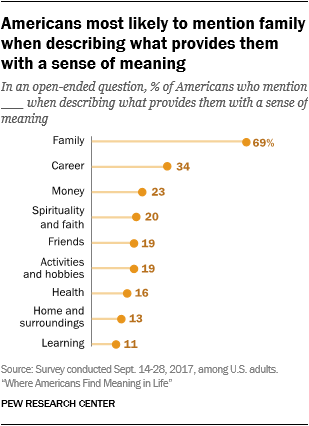 The 2d survey included a fix of closed-concluded (likewise known as forced-selection) questions request Americans to rate how much meaning and fulfillment they draw from each of 15 possible sources identified by the research team. It also included a question request which of these sources gives respondents the virtually pregnant and fulfillment. This approach offers a express series of options but provides a measure out of the relative importance Americans place on various sources of significant in their lives.
The 2d survey included a fix of closed-concluded (likewise known as forced-selection) questions request Americans to rate how much meaning and fulfillment they draw from each of 15 possible sources identified by the research team. It also included a question request which of these sources gives respondents the virtually pregnant and fulfillment. This approach offers a express series of options but provides a measure out of the relative importance Americans place on various sources of significant in their lives.
Across both surveys, the most popular answer is articulate and consistent: Americans are almost likely to mention family when asked what makes life meaningful in the open up-concluded question, and they are most likely to study that they notice "a keen deal" of pregnant in spending time with family in the airtight-ended question.
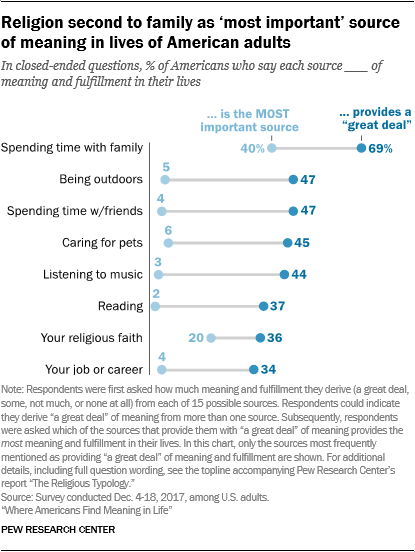 But after family, Americans mention a plethora of sources (in the open-ended question) from which they derive significant and satisfaction: Ane-3rd bring upward their career or chore, virtually a quarter mention finances or money, and one-in-five cite their religious faith, friendships, or various hobbies and activities. Additional topics that are commonly mentioned include existence in skilful health, living in a squeamish place, creative activities and learning or didactics. Many other topics besides arose in the open up-ended question, such equally doing good and belonging to a grouping or community, but these were not as common.
But after family, Americans mention a plethora of sources (in the open-ended question) from which they derive significant and satisfaction: Ane-3rd bring upward their career or chore, virtually a quarter mention finances or money, and one-in-five cite their religious faith, friendships, or various hobbies and activities. Additional topics that are commonly mentioned include existence in skilful health, living in a squeamish place, creative activities and learning or didactics. Many other topics besides arose in the open up-ended question, such equally doing good and belonging to a grouping or community, but these were not as common.
In the closed-ended question, the well-nigh unremarkably cited sources that provide Americans with "a cracking deal" of meaning and fulfillment (later on family) include beingness outdoors, spending fourth dimension with friends, caring for pets and listening to music. By this mensurate, religious faith ranks lower, on par with reading and careers. Merely among those who do find a great deal of pregnant in their religious faith, more than half say information technology is the single most of import source of meaning in their lives. Overall, 20% of Americans say religion is the most meaningful attribute of their lives, second only to the share who say this most family unit (40%).
 People in a wide diversity of social and demographic subgroups mention family as a cardinal source of meaning and fulfillment. Merely there are some patterns in the sources of pregnant that Americans cite, depending on their religion, socioeconomic condition, race, politics and other factors.
People in a wide diversity of social and demographic subgroups mention family as a cardinal source of meaning and fulfillment. Merely there are some patterns in the sources of pregnant that Americans cite, depending on their religion, socioeconomic condition, race, politics and other factors.
Among the key findings from the surveys:
- Family unit is amid the most popular topics across demographic groups. In response to the open-ended question, seven-in-ten Americans mention their family as a source of meaning and fulfillment, and a similar share say in the closed-concluded question that family provides "a great bargain" of pregnant in their lives. While substantial shares in all major subgroups of Americans mention family unit, people who are married are more likely than are those who are non married to cite family as a fundamental source of meaning.
- Americans with high levels of household income and educational attainment are more likely to mention friendship, good health, stability and travel. A quarter of Americans who earn at least $75,000 a year mention their friends when asked to describe, in their ain words, what makes life meaningful, compared with fourteen% of Americans who earn less than $thirty,000 each year. Similarly, 23% of higher-income U.S. adults mention existence in expert health, compared with ten% of lower-income Americans. And among those with a college degree, xi% mention travel and a sense of security as things that make their lives fulfilling, compared with 3% and ii%, respectively, who name these sources of meaning among those with a high school degree or less.
- Many evangelicals notice meaning in faith, while atheists frequently find it in activities and finances.Spirituality and religious faith are particularly meaningful for evangelical Protestants, 43% of whom mention religion-related topics in the open-ended question. Amidst members of the historically blackness Protestant tradition, 32% mention faith and spirituality, as practise 18% of mainline Protestants and xvi% of Catholics. Evangelical Protestants' focus on religious faith also emerges in the closed-ended survey: 65% say information technology provides "a bang-up deal" of pregnant in their lives, compared with 36% for the full sample. At the other end of the spectrum, atheists are more likely than Christians to mention finances (37%), and activities and hobbies (32%), including travel (thirteen%), every bit things that make their lives meaningful. Atheists tend to have relatively high levels of didactics and income, but these patterns hold even when controlling for socioeconomic status.
- Politically bourgeois Americans are more likely than liberals to discover meaning in religion, while liberals find more pregnant in inventiveness and causes than do conservatives. Spirituality and faith are commonly mentioned by very conservative Americans every bit imbuing their lives with meaning and fulfillment; 38% cite it in response to the open-ended question, compared with just viii% of very liberal Americans – a difference that holds even when decision-making for religious affiliation. Past dissimilarity, the closed-ended question finds that very liberal Americans are especially probable to derive "a great bargain" of significant from arts or crafts (34%) and social and political causes (30%), compared with rates of 20% and 12% among very conservative Americans.
Measuring meaning
The closed-concluded questions were included in a survey conducted December. 4 to xviii, 2017, among 4,729 U.S. adults on Pew Research Center's nationally representative American Trends Panel. Respondents were asked to indicate how much meaning and fulfillment they derive ("a great deal," "some," "not much" or "none at all") from each of fifteen possible sources. Additionally, respondents were asked to betoken which of the xv items provides them with the about pregnant and fulfillment. (For details on how the Dec survey was conducted, including full question wording, see Appendix B in "The Religious Typology.")
The open-ended question was included in a survey conducted Sept. 14 to 28, 2017, amid 4,867 U.S. adults on the American Trends Console.1 The question asked, "We're interested in exploring what it means to live a satisfying life. Delight take a moment to reflect on your life and what makes it feel worthwhile – then answer the question below as thoughtfully as y'all can. What about your life do you currently notice meaningful, fulfilling or satisfying? What keeps you going, and why?"
Those answering the question were free to write every bit much as they wanted. The boilerplate respondent wrote 41 words; some wrote hundreds of words. Respondents who gave longer responses tend to be highly educated and are more than likely to be women. The patterns highlighted in this report concord up even when decision-making (in multiple regression models) for the length of the responses as well as the demographic characteristics of respondents.
Researchers used natural language processing methods and human validation to identify topics in the open-ended responses. Put more simply, algorithms were used to clarify the responses for specific terms, and researchers verified the results to ensure accuracy. The goal was to classify whether each response mentions a given topic. Using a computational model of words that regularly appear together in the answers, researchers identified 30 different topics and used sets of keywords to measure out each topic and label the responses. For example, answers that used words like "reading" and "exercise" were classified as mentioning "activities and hobbies." Responses could be coded equally mentioning multiple topics or none at all. For example, responses that mentioned "reading the Bible" were identified equally both mentioning reading as an activity or hobby, and Christianity, faith and spirituality.
The open-ended responses include both wide topics and more specific subtopics inside them. For example, respondents who specifically mention their husband, wife or romantic partner are coded as having cited a spouse or partner (twenty%). Those who reply with specific mention of their children or grandchildren (34%) are coded as such. And all respondents who mention any of these are also included in a broader category of those who mention family (69%), as are those who employ words similar "mom," "sibling," "niece" or simply "family."
Similarly, responses that contain words like "Jesus" or "Christian" are included in the Christianity category (v%). The category of those who mention religion and spirituality (xx% of all respondents) includes the v% who mention Christianity as well every bit those who mention other religions or offering more general references with words similar "God," "organized religion," "creator," or only "faith" or "spirituality."
Full details most how the open-ended responses were coded are provided in the Methodology.
In many cases, the results of the open-concluded and closed-ended questions resemble ane another. For instance, 69% of respondents mention something having to do with family in their open-concluded response to the question of what gives their life meaning and satisfaction, and an identical share (69%) say in the airtight-ended question that they derive "a dandy deal" of significant and fulfillment from family. Similarly, career is mentioned every bit a source of meaning and fulfillment past 1-third of respondents in both the open-ended and the closed-ended questions.
In other cases, however, the two approaches to request the question nigh what makes life meaningful yield very different results – at least at first glance. For example, in the open-concluded question, just 5% of respondents mention something well-nigh pets or animals when describing what makes their lives meaningful. But in the airtight-ended question, fully 45% of Americans say "caring for pets" provides them with "a bully deal" of pregnant and fulfillment.
These divergent results underscore the very different nature of the two kinds of questions. The results of the open up-ended question propose that when asked to depict, in their own words, what provides them with meaning and fulfillment and satisfaction in life, relatively few people think immediately of pets or caring for animals. Other things – including family, friends, career and religious faith – may come to mind much more quickly for almost people.
Nonetheless, when prompted explicitly in the closed-ended question to think virtually their pets, nearly half of Americans acknowledge that caring for their animals does, indeed, provide them with a great deal of meaning and fulfillment, and an additional iii-in-ten say they go "some" meaning and fulfillment from their relationships with animals.
The surveys find similar patterns with respect to being outdoors and experiencing nature, fettle activities, and creative hobbies (such equally arts and crafts or making music). These are all cited equally providing a great deal of meaning past much larger shares of respondents when they are reminded near them in the closed-ended question than when they are asked to limited, in their own words, what makes their lives meaningful and fulfilling.
Interpreting open-concluded responses
The open-ended responses were coded using a computer-assisted approach in which certain keywords were identified as indicators of detail sources of meaning or fulfillment. For the most function, the estimation of responses including these keywords is straightforward because respondents were referring to topics in an overwhelmingly positive fashion. Responses containing words similar "Jesus," "Christ" or "Bible" are clearly indicative of respondents who notice meaning in Christianity, and those containing phrases like "traveling" and "exploring the world" are indicative of respondents who enjoy traveling. The keywords related to security and stability also conveyed something respondents feel positive about, rather than something they lack. Similarly, the words used to hash out existence in good wellness were distinct enough from those used to talk over health difficulties and medical issues that researchers were able to measure out both concepts with 2 dissimilar sets of keywords.
Just the language surrounding other topics was more nuanced, making the interpretation of some kinds of responses more cryptic. For instance, all responses that included any of a dozen words related to coin or finances (east.g., "money," "pay" or "paid," "income," "afford," "salary," "finance" or "financially," etc.) were coded as having mentioned coin, regardless of context, since the figurer-assisted coding arroyo was unable to distinguish whether the keywords were used in a positive or negative sense. Human being coding conducted by researchers institute that most such responses (77% of all responses coded as having referenced money) mention money in a positive sense. For example, one respondent finds life meaningful in part because, "[I have] an interest in my chosen career and I look to be well paid for it in coming years." But others (23% of all responses that mention money) hash out money in a more neutral way (similar the respondent who said, "I think life is more wealth in money") or in a negative context (like the respondent who indicated she finds meaning in her religion despite the fact that she has "a very difficult time financially").
However, in bringing up each topic, respondents are indicating that these factors affect their sense of meaning in some manner. Mentions of specific topics should exist interpreted as things that pertain to or bear upon a respondent's sense of meaning or satisfaction in life, but it is besides important to keep in heed that not all mentions of the topic are necessarily positive or refer to respondents' electric current feelings (equally opposed to the way they felt at some bespeak in the past).
Different groups of Americans find meaning in different places
Dissimilar groups of Americans mention different topics when asked what gives them meaning in life. Those with loftier income levels are more than probable to mention friends and being in good health. Evangelical Protestants are more than likely than Christians in full general to say that they discover a great bargain of meaning in faith. Those who identify as politically liberal mention artistic activities more than Americans overall, while conservatives are more probable to bring upwardly faith, fifty-fifty later decision-making for differences in their religious identification. For the most function, these and other patterns are observed in both the open-ended and closed-ended questions (where direct comparisons are possible).
Americans with college household income, more pedagogy are most likely to mention friendships, good wellness, stability
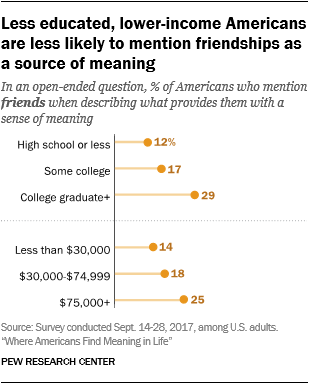 There are several sources of meaning that are mentioned much more oftentimes by Americans with high incomes and levels of educational attainment than past those with lower incomes and less education. For case, the open-ended question finds that higher levels of education and income are associated with an increased likelihood that a respondent will cite friendships and good wellness. Furthermore, high levels of teaching also are associated with mentioning a sense of security or stability and recreational activities as key sources of pregnant and fulfillment.
There are several sources of meaning that are mentioned much more oftentimes by Americans with high incomes and levels of educational attainment than past those with lower incomes and less education. For case, the open-ended question finds that higher levels of education and income are associated with an increased likelihood that a respondent will cite friendships and good wellness. Furthermore, high levels of teaching also are associated with mentioning a sense of security or stability and recreational activities as key sources of pregnant and fulfillment.
Conversely, there are few topics that those with lower levels of income and education mention more often than others. Taken together, these findings suggest that those respondents who are socioeconomically advantaged may have resources – similar free time to spend with friends or money to pursue opportunities to travel – that those who are less socioeconomically privileged simply do not have.
 For example, those with a college degree are more likely than those with a high school diploma or less education to mention their friends (29% vs. 12%). In that location is a similar gap across income groups, even after bookkeeping for education: A quarter of those who earn more $75,000 a year mention friends, compared with 14% of those who have household incomes of less than $thirty,000 a twelvemonth. One respondent in the highest income and education groups said: "Enjoying beingness with friends and family. What keeps me going is gourmet cooking for my friends and family."
For example, those with a college degree are more likely than those with a high school diploma or less education to mention their friends (29% vs. 12%). In that location is a similar gap across income groups, even after bookkeeping for education: A quarter of those who earn more $75,000 a year mention friends, compared with 14% of those who have household incomes of less than $thirty,000 a twelvemonth. One respondent in the highest income and education groups said: "Enjoying beingness with friends and family. What keeps me going is gourmet cooking for my friends and family."
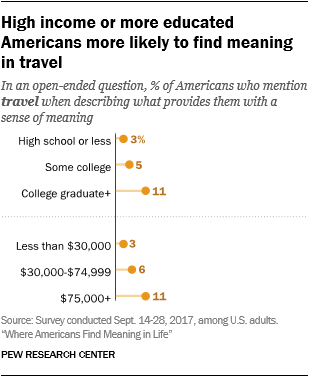 Education and income as well are associated with whether respondents mention the health of themselves or loved ones. About a quarter of college graduates (24%) and those with household incomes of $75,000 or more (23%) mention being in good health when describing what gives them a sense of significant. For case, one respondent at the highest income and education levels said, "I am stiff and fit, and while I am facing the physical changes that you lot face as you lot age, I am doing what can be done to defer them." In contrast, those with incomes under $xxx,000 and those with no college experience are less likely to mention the topic (10% and eleven%, respectively).
Education and income as well are associated with whether respondents mention the health of themselves or loved ones. About a quarter of college graduates (24%) and those with household incomes of $75,000 or more (23%) mention being in good health when describing what gives them a sense of significant. For case, one respondent at the highest income and education levels said, "I am stiff and fit, and while I am facing the physical changes that you lot face as you lot age, I am doing what can be done to defer them." In contrast, those with incomes under $xxx,000 and those with no college experience are less likely to mention the topic (10% and eleven%, respectively).
In add-on to being less likely to mention being in expert health, Americans whose household incomes are beneath $30,000 are somewhat more than probable than those who earn $75,000 or more to mention health difficulties (coded as a dissimilar topic) equally part of their response to the open-ended question most what makes their life meaningful. As one lower-income respondent put it, "It's been more than difficult. Every year I've needed surgery on something. I'one thousand nevertheless striving to practise my best, to live my most productive life."
Travel is as well mentioned more oftentimes past those with loftier household incomes, equally well every bit those with higher degrees – 11% in both groups bring up traveling, exploring new places, or going on holiday, compared with 3% of those with no college experience or incomes under $thirty,000. As one low-income higher-educated respondent put it, "I travel to see friends and family unit. I live in a cute state where I can come across, hear and appreciate God'due south creation." On the other hand, i high-income person with no college experience echoed similar sentiments: "Traveling and seeing things I take never seen, enjoying unproblematic things like the outdoors and warm weather."
Those with higher incomes or higher experience are too far more likely to mention their job or career when describing what gives them a sense of pregnant. Nearly one-half – 48% – of both loftier-income and college-educated Americans mention their job. By contrast, merely 24% of those without college experience and 22% of those making less than $30,000 cite their job or career when discussing how they notice meaning and satisfaction in life.2
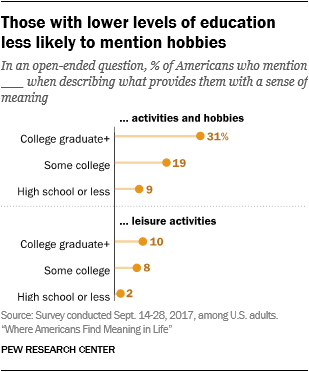 Levels of education – but not income – have a stiff human relationship with finding meaning in personal activities and hobbies, as well as other broad topics like feeling a sense of security and stability, and learning or education itself. College graduates are about iii times equally likely as Americans with less didactics to mention activities of whatsoever kind (31% among college graduates, compared with just 9% of those with no college experience). In particular, they more ofttimes cite leisure activities (x%, compared with 2% among those with a high schoolhouse caste or less). Those with college or graduate degrees also are more than likely to mention learning or pedagogy when describing what gives them a sense of meaning (16% vs. 6% of Americans with a high school degree or less). For case, i respondent with a college degree said, "I'grand a gardener and use cover crops to increment soil tilth and fertility. This requires that I continue to explore and learn about the soil ecosystem."
Levels of education – but not income – have a stiff human relationship with finding meaning in personal activities and hobbies, as well as other broad topics like feeling a sense of security and stability, and learning or education itself. College graduates are about iii times equally likely as Americans with less didactics to mention activities of whatsoever kind (31% among college graduates, compared with just 9% of those with no college experience). In particular, they more ofttimes cite leisure activities (x%, compared with 2% among those with a high schoolhouse caste or less). Those with college or graduate degrees also are more than likely to mention learning or pedagogy when describing what gives them a sense of meaning (16% vs. 6% of Americans with a high school degree or less). For case, i respondent with a college degree said, "I'grand a gardener and use cover crops to increment soil tilth and fertility. This requires that I continue to explore and learn about the soil ecosystem."
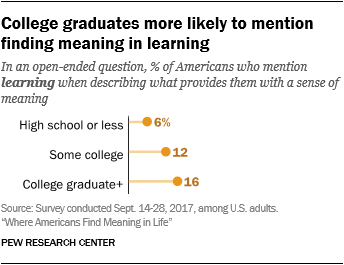 College-educated Americans as well are more than probable to mention having a sense of security or stability. Ane-in-ten of those with higher degrees (xi%) say they derive meaning from a sense of security, compared with just two% of those without whatever higher experience – regardless of their age or income. One respondent who has a postgraduate degree said, "Beingness condom and secure. Knowing that my family volition be taken intendance of and having their needs met. My children having a future as bright as mine."
College-educated Americans as well are more than probable to mention having a sense of security or stability. Ane-in-ten of those with higher degrees (xi%) say they derive meaning from a sense of security, compared with just two% of those without whatever higher experience – regardless of their age or income. One respondent who has a postgraduate degree said, "Beingness condom and secure. Knowing that my family volition be taken intendance of and having their needs met. My children having a future as bright as mine."
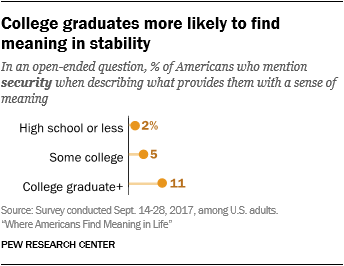 Like the open up-ended question, the airtight-ended questions find that those with more socioeconomic resources may accept more than opportunities for social activities than those who have fewer resources. For example, 55% of college graduates say spending time with friends provides them with "a great deal" of meaning and fulfillment, compared with forty% of those with a loftier school degree or less. Similarly, more than half (53%) of those with household incomes in a higher place $75,000 a twelvemonth say that friends provide them with "a cracking deal" of meaning, while only 41% of those with incomes under $thirty,000 say the same.
Like the open up-ended question, the airtight-ended questions find that those with more socioeconomic resources may accept more than opportunities for social activities than those who have fewer resources. For example, 55% of college graduates say spending time with friends provides them with "a great deal" of meaning and fulfillment, compared with forty% of those with a loftier school degree or less. Similarly, more than half (53%) of those with household incomes in a higher place $75,000 a twelvemonth say that friends provide them with "a cracking deal" of meaning, while only 41% of those with incomes under $thirty,000 say the same.
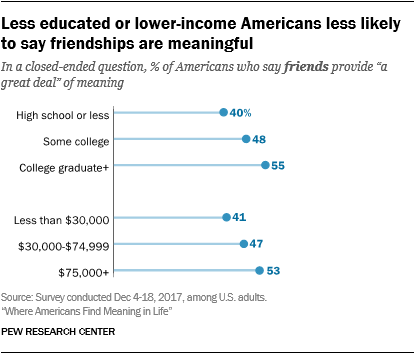 However, while pedagogy and income are associated with whether respondents mention their job or career in the open up-ended question, these factors have no substantial effect on whether Americans say in the airtight-concluded question that they describe "a bang-up bargain" of meaning from their task or career. This suggests that those with college incomes or more instruction do not necessarily notice more meaning in their jobs, but that they are notably more likely to recollect of and bring upward their careers when asked to draw in their own words what gives them a sense of meaning in their lives.
However, while pedagogy and income are associated with whether respondents mention their job or career in the open up-ended question, these factors have no substantial effect on whether Americans say in the airtight-concluded question that they describe "a bang-up bargain" of meaning from their task or career. This suggests that those with college incomes or more instruction do not necessarily notice more meaning in their jobs, but that they are notably more likely to recollect of and bring upward their careers when asked to draw in their own words what gives them a sense of meaning in their lives.
Where unlike racial groups find meaning
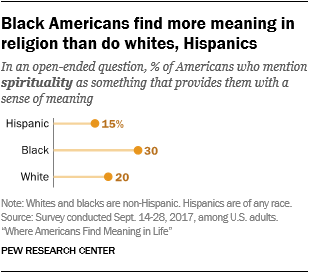 Regardless of their particular religious denomination, black Americans are more likely than others to mention faith and spirituality when describing (in the open-concluded question) what gives them a sense of meaning.3 Fully three-in-ten black Americans (xxx%) mention spirituality and faith, compared with 20% of whites and 15% of Hispanics.
Regardless of their particular religious denomination, black Americans are more likely than others to mention faith and spirituality when describing (in the open-concluded question) what gives them a sense of meaning.3 Fully three-in-ten black Americans (xxx%) mention spirituality and faith, compared with 20% of whites and 15% of Hispanics.
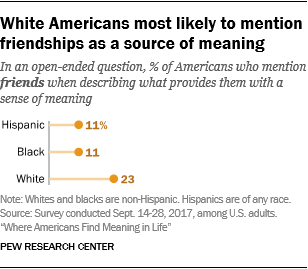 Race and ethnicity also are linked with a number of other sources of meaning, independent of socioeconomic factors. Specifically, white Americans are much more likely than blackness and Hispanic Americans to mention friends, stability and security, and a positive abode environment as sources of pregnant in their lives, even when controlling for education and income.
Race and ethnicity also are linked with a number of other sources of meaning, independent of socioeconomic factors. Specifically, white Americans are much more likely than blackness and Hispanic Americans to mention friends, stability and security, and a positive abode environment as sources of pregnant in their lives, even when controlling for education and income.
While 23% of white Americans mention friends when describing what gives their lives meaning, fewer blackness and Hispanic Americans do so (xi% in each grouping). Furthermore, blackness and Hispanic Americans are much less likely than whites to mention enjoying where they live; five% and seven% do and so, compared with 16% of white Americans. And while 13% of blacks and 14% of Hispanics mention finances and coin in some fashion, more white Americans (26%) mention the topic when describing what makes their lives meaningful.4
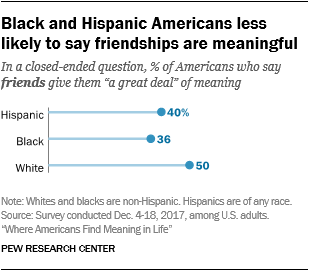 Analysis of the open-ended responses likewise shows that black Americans are less likely than others to mention existence in good health (8%, compared with 15% of Hispanics and 18% of whites), and black Americans are notably less likely than whites to mention pets or animals or enjoying the outdoors and nature. While these topics were not brought up frequently in the open-ended responses by any group, hundreds of white respondents mentioned pets or animals and nature or the outdoors. In contrast, fewer than 10 black respondents mentioned either topic.
Analysis of the open-ended responses likewise shows that black Americans are less likely than others to mention existence in good health (8%, compared with 15% of Hispanics and 18% of whites), and black Americans are notably less likely than whites to mention pets or animals or enjoying the outdoors and nature. While these topics were not brought up frequently in the open-ended responses by any group, hundreds of white respondents mentioned pets or animals and nature or the outdoors. In contrast, fewer than 10 black respondents mentioned either topic.
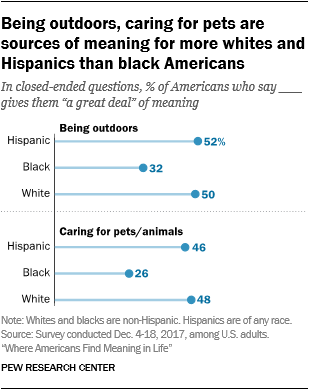 Similar patterns are found in the airtight-ended questions, in which fully half of black Americans (52%) say they derive "a nifty deal" of significant from their faith, compared with 37% of Hispanic Americans and a third of white Americans. Furthermore, a third of black Americans (32%) point that faith is their single most of import source of meaning in life, compared with 18% of whites and sixteen% of Hispanics.
Similar patterns are found in the airtight-ended questions, in which fully half of black Americans (52%) say they derive "a nifty deal" of significant from their faith, compared with 37% of Hispanic Americans and a third of white Americans. Furthermore, a third of black Americans (32%) point that faith is their single most of import source of meaning in life, compared with 18% of whites and sixteen% of Hispanics.
The airtight-ended survey too finds that both black and Hispanic Americans are less likely than whites to say that spending fourth dimension with friends provides them with "a great deal" of meaning. And whereas well-nigh half of Hispanics and whites say they go "a great deal" of meaning from pets or spending time in nature, merely a quarter of blackness respondents say they get "a great deal" of pregnant from pets (26%), and one-third say the aforementioned about nature (32%).
Amongst evangelicals, religion ranks equally the nearly of import source of significant
Faith is not the most ordinarily referenced source of meaning and fulfillment in either survey. In the open-ended question, i-in-5 adults mention spirituality and religious religion when describing the things they find meaningful and fulfilling, which is on par with the share who mention friends and various activities or hobbies. And in the closed-ended question, 36% of those surveyed say they become "a great deal" of meaning and fulfillment from their religious organized religion, which is roughly equivalent to the share who depict the aforementioned level of meaning from reading or from their career.
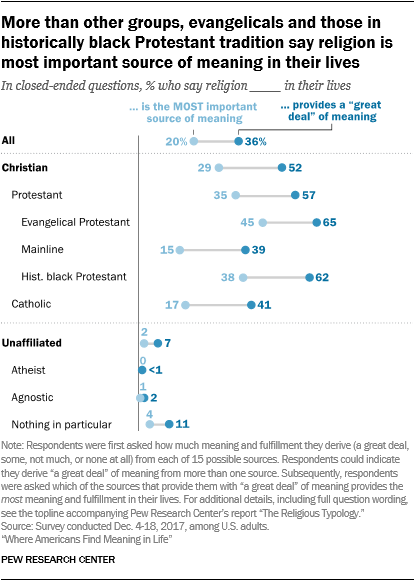 Simply while religion is not a universal source from which Americans say they obtain "a great deal" of meaning, it is a highly salient source of fulfillment amongst those who select it. Indeed, among those who say (in the closed-ended survey) that faith provides them with "a corking bargain" of significant, 55% say that faith is their well-nigh of import source of meaning, while fewer (thirty%) say family provides them with the about meaning and fulfillment.
Simply while religion is not a universal source from which Americans say they obtain "a great deal" of meaning, it is a highly salient source of fulfillment amongst those who select it. Indeed, among those who say (in the closed-ended survey) that faith provides them with "a corking bargain" of significant, 55% say that faith is their well-nigh of import source of meaning, while fewer (thirty%) say family provides them with the about meaning and fulfillment.
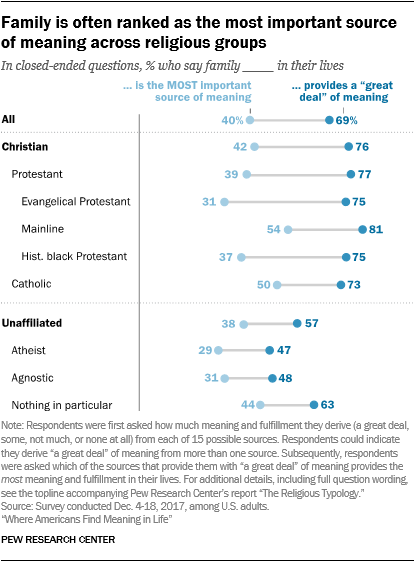 For members of some religious traditions every bit well – specially evangelical Protestants and members of the historically blackness Protestant tradition – faith matches or exceeds anything else as the elevation source of meaning and fulfillment. About two-thirds (65%) of evangelical Protestants say they find "a great deal" of meaning in their religious religion, including 45% who say religion is the most important source of meaning in their lives – higher than the share who say this nigh family (31%). A like share of those in the historically black Protestant tradition (62%) also report that their religious religion provides them with "a slap-up deal" of meaning, including 38% who say religion is the most important source of pregnant in their lives.
For members of some religious traditions every bit well – specially evangelical Protestants and members of the historically blackness Protestant tradition – faith matches or exceeds anything else as the elevation source of meaning and fulfillment. About two-thirds (65%) of evangelical Protestants say they find "a great deal" of meaning in their religious religion, including 45% who say religion is the most important source of meaning in their lives – higher than the share who say this nigh family (31%). A like share of those in the historically black Protestant tradition (62%) also report that their religious religion provides them with "a slap-up deal" of meaning, including 38% who say religion is the most important source of pregnant in their lives.
By comparison, roughly 4-in-ten Catholics (41%) and mainline Protestants (39%) say their religious organized religion provides them with "a swell deal" of pregnant and fulfillment. Too, in contrast with evangelical Protestants and members of the historically black Protestant tradition, fewer Catholics and mainline Protestants say religion is the most of import source of pregnant in their lives (17% and 15%, respectively). Instead, they are amongst the most likely of all religious groups to say that family provides them with the most meaning (50% and 54%, respectively).
In the open-ended question, too, evangelical Protestants are more likely than other Americans to mention faith and spirituality (and Christianity, specifically) when asked what makes life meaningful. Overall, 43% of evangelicals mention spirituality or religion in some way, including xiv% who make specific references to their Christian faith. For example, one evangelical respondent said, "My conventionalities in Jesus Christ and his teachings helps me greatly when things get really difficult."
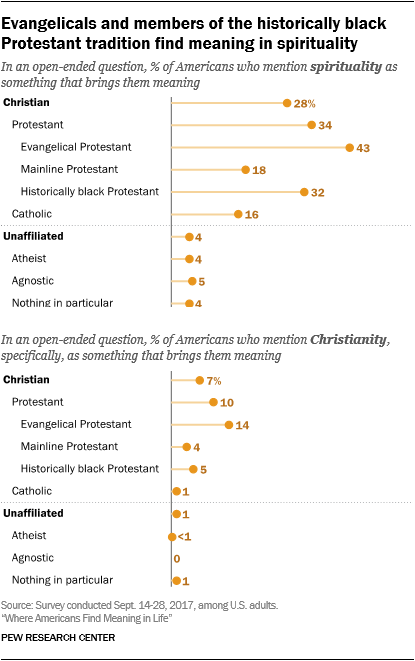 Spirituality is also a ordinarily mentioned topic among those in the historically black Protestant tradition, amid whom 32% mention spirituality or faith as a source of meaning in their lives. Smaller shares of mainline Protestants (18%) and Catholics (16%) mention faith and spirituality as sources of meaning and fulfillment.
Spirituality is also a ordinarily mentioned topic among those in the historically black Protestant tradition, amid whom 32% mention spirituality or faith as a source of meaning in their lives. Smaller shares of mainline Protestants (18%) and Catholics (16%) mention faith and spirituality as sources of meaning and fulfillment.
Not surprisingly, very few self-described atheists mention spiritual topics when asked what makes life meaningful. Instead, atheists are much more likely than others to mention finances or interest in various kinds of activities. Indeed, roughly a third of atheists (37%) hash out finances in response to the open-ended question, compared with 26% among evangelical Protestants, 22% amid Catholics, 20% among mainline Protestants and xv% amid those in the historically blackness Protestant tradition. One atheist described finding meaning in "doing work and acting in a style that is meaningful to your beliefs. Being financially comfortable to be able to do things that make you happy."
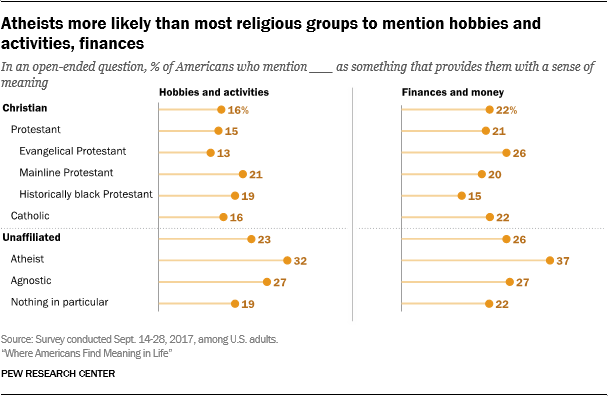
Atheists are especially likely to mention hobbies and activities in general – roughly a third (32%) of atheists do so. In item, they are more than probable than Americans overall to mention creative activities like painting and writing, leisure activities similar playing games and watching movies, and traveling or exploring new places as sources of pregnant and fulfillment in their lives. For example, i said, "I also detect a lot of pleasance in trying new things, athletics, and exploration. I have the coin and the flexible schedule to go along adventures and challenge myself physically."
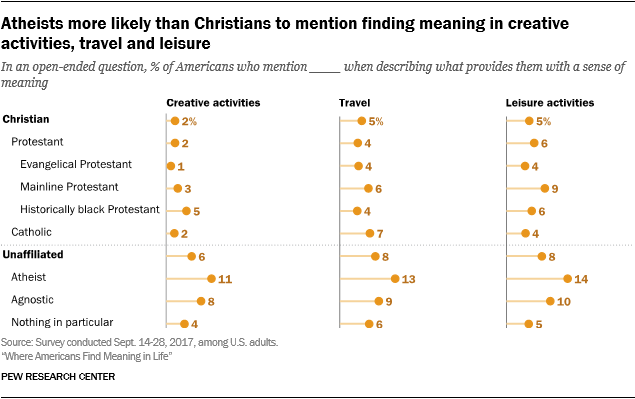
Conservative Americans more than likely to find meaning in religion, while liberal Americans more than probable to detect significant in creativity and social causes
Americans who identify equally conservative or very conservative are more than likely than others to say they find "a corking deal" of meaning in their religious faith, while those who are liberal or very liberal are more probable than conservatives to say they find a great deal of significant in arts and crafts and social or political causes.
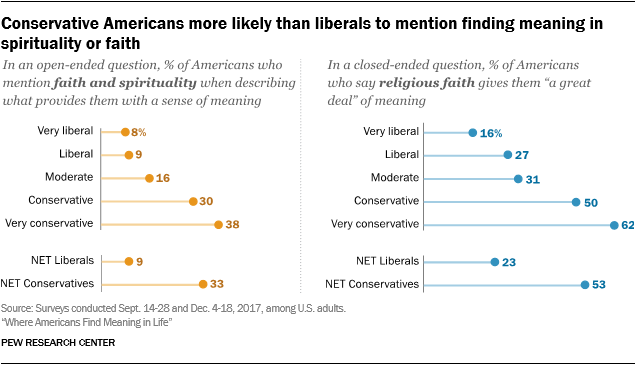
Regardless of their religious affiliation, conservative or very bourgeois Americans are more probable than liberals to mention (in their open-ended responses) their spirituality or faith equally a key source of meaning in their lives (33% vs ix%). As one conservative respondent said, "Commencement, my life is rooted in God and the knowledge that He provides unconditional honey and support regardless of what is happening in the world. With God at the center of my life, circumstances may change merely beloved, peace, and joy remain."
The closed-ended question echoes this pattern. Conservative U.Due south. adults are at least twice equally probable every bit liberals to say organized religion provides them with "a keen bargain" of pregnant (53% vs 23%). This is peculiarly true of very conservative Americans: Six-in-ten (62%) say their religious faith provides them with "a keen deal" of significant, including 41% who say that information technology is their about important source of pregnant. In dissimilarity, but 16% of very liberal Americans say that they find "a smashing deal" of meaning in religion, including just 5% who say that it provides them with the well-nigh significant in life. And fully half of very liberal Americans report that religion does not contribute at all to their sense of meaning.
Liberals, meanwhile, are more likely than conservatives to say they derive significant and fulfillment from listening to music and arts and crafts. Fully half of liberals say they become "a slap-up deal" of meaning from listening to music (52%), and three-in-ten (31%) say they go "a great deal" of pregnant from craft. Past comparison, 34% of conservatives derive "a great bargain" of meaning from listening to music, and 18% say the same about arts and crafts. These results come from the closed-ended question, just as one self-identified liberal put it in responding to the open-ended question, "Art and honey keep me going. I am in a human relationship with the honey of my life again, and he encourages me to follow my centre and pursue whatever art it is I want to follow at the time. I paint, draw, do photography, make jewelry, practise paper crafts, minor woodworking and wood burning, stitch costumes and other clothing, blend spices, dry flowers, and sometimes practise projects that might exist chosen 'fusion' art, such as painting and adding pieces of paper crafts."
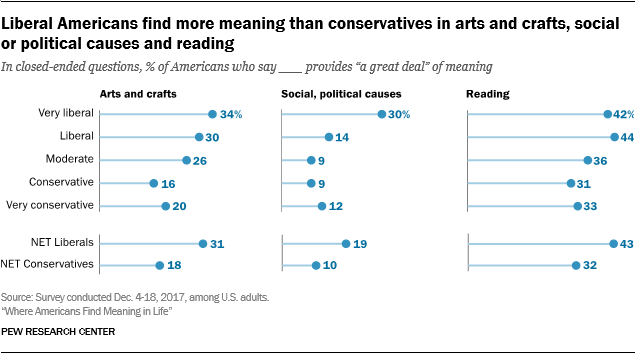
Liberal Americans are besides more likely than conservatives to say that social or political causes provide them with "a great deal" of significant (19% vs. x%). And among those identifying as "very liberal," iii-in-10 (thirty%) say they find a great deal of pregnant in social or political causes, almost 3 times the rate seen in the full general public. In the open-ended question, ane very liberal respondent said they find pregnant in "volunteering for causes I believe in like ending hunger and social justice issues," among other activities. Liberals are as well notably more likely to say that they find "a peachy deal" of significant in reading: Four-in-10 say they do (43%), compared with 37% of Americans overall.
Younger Americans less likely to mention religion, but describe more pregnant from learning than older Americans
Just ten% of U.Southward. adults nether age thirty mention spirituality, faith or God when describing (in the open-ended question) what affects their sense of meaning. By contrast, three-in-ten adults ages 65 and older mention organized religion when describing what makes their life meaningful and fulfilling.
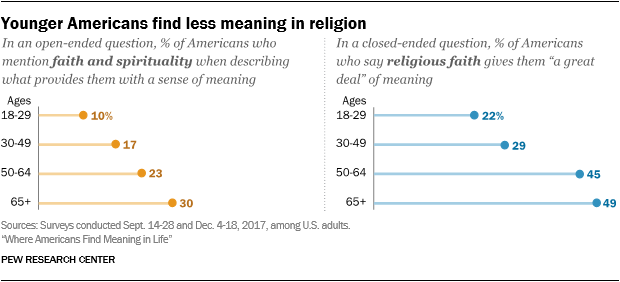
The airtight-concluded question finds a like relationship betwixt age and finding significant in faith: Roughly one-in-v adults under xxx (22%) study that religion provides them with "a not bad deal" of pregnant, while fully a tertiary (34%) say religion provides them with no significant at all. By contrast, half of those ages 65 or older study that they describe "a great deal" of meaning from religion, and only 12% say they do not get any meaning and fulfillment from religion. Iii-in-x (29%) of those ages 65 or older say religion is the top source of meaning in their lives, while 10% of adults under 30 say the same.
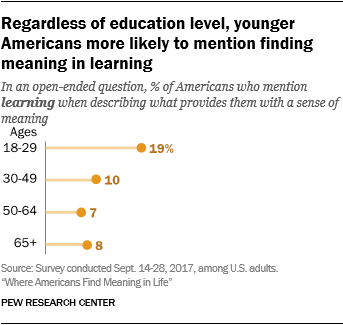 Meanwhile, U.Due south. adults nether age 30 are more than likely than older Americans to say (in the open-concluded question) that they find meaning in learning or education (19% practice then, compared with 9% among older Americans). This departure between younger and older adults is statistically significant even bookkeeping for different levels of educational attainment between the groups, although it may be connected to the fact that a much higher share of immature adults are current or recent total-fourth dimension students.
Meanwhile, U.Due south. adults nether age 30 are more than likely than older Americans to say (in the open-concluded question) that they find meaning in learning or education (19% practice then, compared with 9% among older Americans). This departure between younger and older adults is statistically significant even bookkeeping for different levels of educational attainment between the groups, although it may be connected to the fact that a much higher share of immature adults are current or recent total-fourth dimension students.
Married Americans more likely to mention family, religion
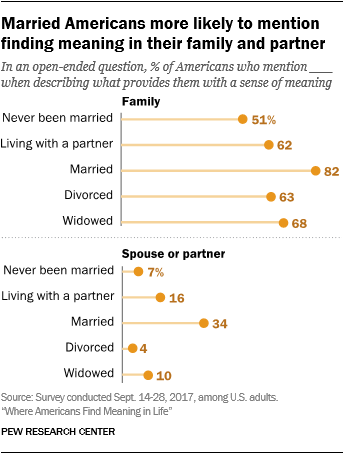 While family is a primal source of meaning for Americans in many different demographic categories, there are some variations betwixt subgroups. For example, women are somewhat more likely than men to say family provides a nifty deal of pregnant in their lives.
While family is a primal source of meaning for Americans in many different demographic categories, there are some variations betwixt subgroups. For example, women are somewhat more likely than men to say family provides a nifty deal of pregnant in their lives.
When asked in the open-ended question about what gives them a sense of meaning and satisfaction in life, married Americans are more likely than unmarried people to mention family (which includes specific references to i's spouse or children). Iv-in-five married people (82%) mention family as a source of meaning and fulfillment (including 34% who specifically mention their spouse or partner), compared with 59% of unmarried U.South. adults. Married Americans are besides more likely to mention spirituality or faith; 23% do, compared with xiii% of Americans that take never been married.
Similar patterns emerge in the closed-ended question. Married Americans are more likely than unmarried people to say that family provides them with "a swell bargain" of meaning (lxxx% vs. 60%). And half (49%) say that it is their nigh important source of meaning, compared with 32% of unmarried Americans. Married people also are more likely than unmarried people to indicate that they find "a not bad bargain" of meaning in religion (41% vs. 32%), and a quarter (24%) say religion is the almost important source of meaning in their lives, compared with sixteen% among unmarried Americans. Ane married American explained that they detect meaning in "association with family and friends. … The relationship I share with my wife. But most of all, my relationship with my Lord and Savior Jesus Christ."
Source: https://www.pewforum.org/2018/11/20/where-americans-find-meaning-in-life/
0 Response to "A Survey Found That the American Family Generates"
Post a Comment